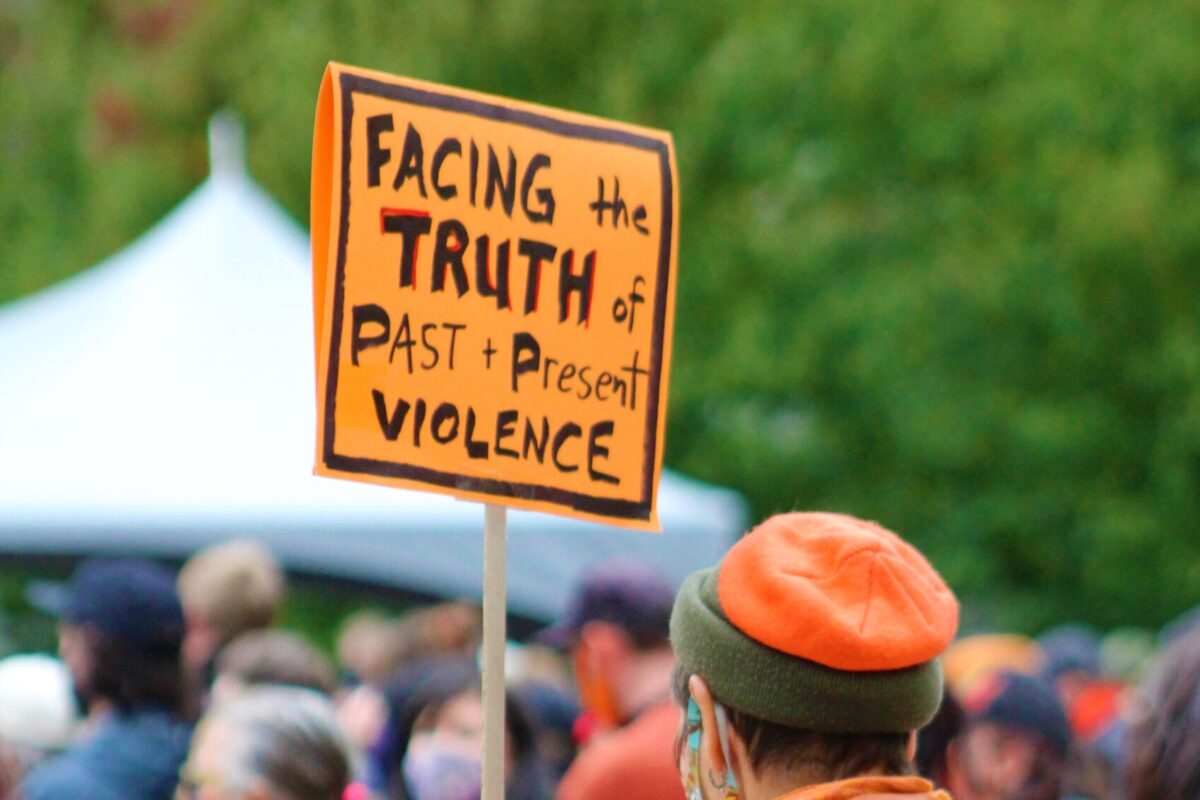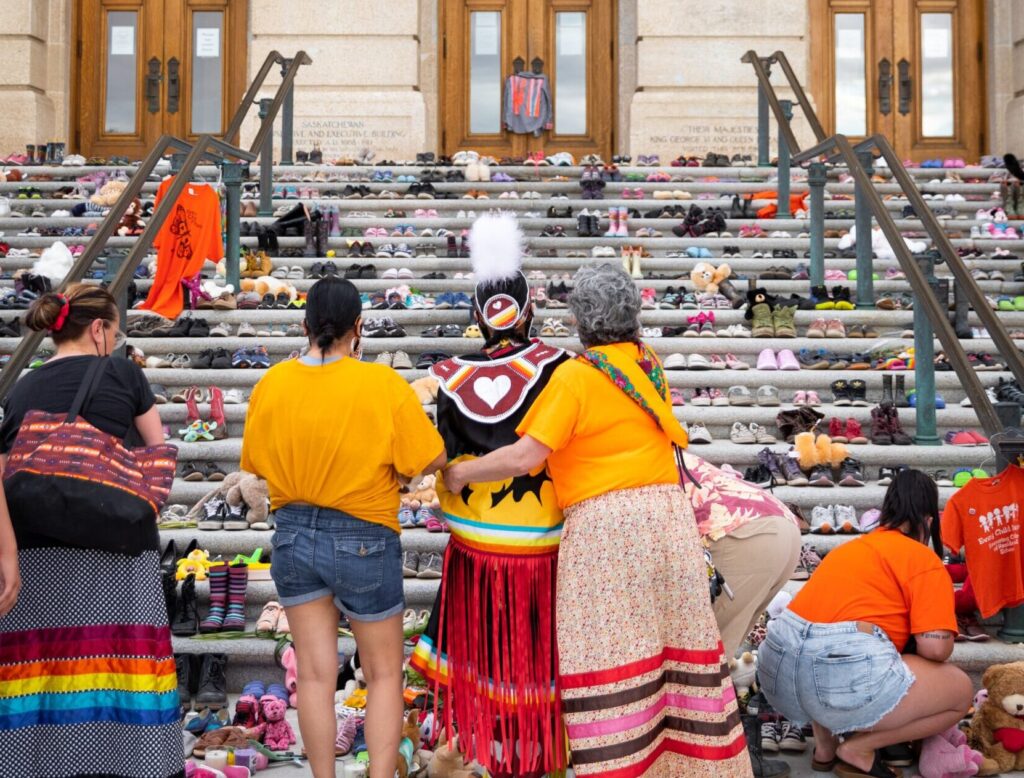
Truth and reconciliation again? How to move out of shame and into accountability
Introduction
September 30th is known across Turtle Island as Orange Shirt Day, or Canada’s National Day for Truth and Reconciliation. It’s a complicated day commemorating the nation’s legacy of residential schools.
Since our initial expression of commitment to Truth and Reconciliation in 2014, the Canadian Unitarian Council has dedicated itself to learning about the shared history and current realities of Indigenous and non-Indigenous Peoples in Canada and taking action toward repairing historic and ongoing harm.
Many people who are uncolonizing themselves and their institutions have told us they feel shame regarding all that has happened (and continues to happen) with Indigenous peoples and the unearned privileges colonialism heaps onto many of us. Some express shame for wanting to keep the privileges they have become accustomed to and are bewildered about how to move forward ethically. Let’s face it: , shame is uncomfortable at best and debilitating at worst. The more conscious we become of what is going on, the worse we tend to feel, and the harder we try to become radically inclusive, the more likely we are to recognize how we fall short. Awareness of the gap between our aspirations and reality can feel paralyzing, and yet feeling shame does not justify throwing in the towel.
How do we close the gap without getting caught up in our discomfort?
Recognizing the work we have done so far while not letting ourselves off the hook is the tension we choose to embrace on this day.
Last year, we created a bold worship service that addresses this tension. You can watch it here:
This year, we want to understand why moving out of shame (and into accountability) is essential. In this blog, we share how to engage with the process. We provide some new and familiar materials to explore related to reconciliation and inclusion work.
What is Reconciliation, and Why Does it Matter?
Reconciliation is the term used to describe repairing the damaged relationship between the Canadian Government and Indigenous Nations. Some folks reject this term because it gives the impression that there was a good relationship in the first place. Others, including some Indigenous leaders, believe it to be yet another form of colonialism where increased awareness within Canadian society is passed off as meaningful change when, in fact, little changes for Indigenous Peoples and the Land (see Taiaiake Alfred pg 11-13). We use the term here because it is familiar and points to addressing imbalances in privileges and power.
While there are many roads towards right relations with Indigenous peoples and the Land, it is crucial to understand the impact each gesture has on the actual outcome of the promise. Symbolic ways (like wearing orange on September 30th) add visibility and awareness, while concrete actions (like joining the Land Back movement) return the Land and honour Indigenous sovereignty. We won’t go over them here, but you can read the 94 Calls to Action and get started (or continue) implementing them yourself.
What about shame?
Hearing the stories of Indian Residential School survivors, Sixties Scoopers, and Indigenous friends and neighbours is heartbreaking, maddening, and horrifying. Learning that we are benefiting from these injustices can bring up intense emotions of guilt and shame. Many folks will try to deflect or express these uncomfortable feelings in ways that centre their experience, forcing Indigenous peoples to the margins. The same can be true for inclusion work. It is crucial that we not saddle Indigenous peoples with the burden of supporting us, their oppressors, through this work that is ours to do.
Why accountability?
Transmuting shame into accountability is a spiritual practice that has the potential to transform us on a deeper level, both individually and culturally. It is at the heart of repairing harm. Instead of moving away from the discomfort that arises, we lean in further to discover how Indigenous people’s oppression intersects with our unearned privilege. Then, we ask ourselves how to relinquish privileges and become comfortable with less.
The promise of reconciliation is not the action, and to promise without follow through only perpetuates the harm cycle of harm, breaking any trust that might be established in a relationship. We cannot depend on our governments to make changes if we are not willing and able to do it ourselves.

How to move out of shame and into accountability
We spoke with Elder Sharon Jinkerson Brass and Traditional Teacher Dave Skene for an Indigenous perspective on overcoming shame. Here’s what we learned:
STEP 1 – Get to know your shame
- Acknowledge your shame.
- Recognize the landscape from which your shame has grown: – what cultures, languages, and norms support a hierarchy or separateness that allows shame to exist? It existed before you were born and is what you were domesticated into.
- Acknowledge the behaviours you feel shame about. Instead of thinking, “I am bad” (shame), think, “These beliefs and behaviours cause harm” (guilt);, “I will change them” (accountability).
- Sit with your deep feelings and notice what comes up without judgment. – This is the hard part, and it is not to be rushed.
STEP 2 – Let it go
- Let go of control; accept the truth.
- Connect with your humanity and authenticity.
- Reconcile with The Land – get humble! Watch this video with Dave Skene
- Be conscious of your interconnectedness with all creation.
- Remember you are part of a larger movement toward justice and equity and that these individual moments of truth can bring healing to the collective.
- Release bound-up self-focused energy for the greater good
STEP 3 – Take action
- Focus on actions to repair relationships in a good and humble way.
- Use compassion in your interactions with others to create balance and live into oneness.
- Co-create thriving relationships. Colonization is about destroying relationships.
Watch the interviews here:
Out of Shame, Into Oneness with Sharon Brass
Full Conversation with Sharon:
Out of Shame, into Compassion with Dave Skene
Reconciling With the Land – Dave Skene
Tips and Reminders for moving out of shame and into accountability
- Lean into the discomfort.
- Be curious about it.
- Feeling alone? Sit in a circle of atonement or a designated place for people to heal. Call a trusted friend or professional to help process your emotions.
- Remember, being in right relations is an ongoing practice, and relationships of trust are built over time.
- Actively relinquish unearned privilege and use your privilege to side with Indigenous peoples.
Closing
Relationship is the core of everything we do, and everything we are. A healthy and vibrant relationship between nations begins with a healthy and vibrant relationship with self, and a healthy and vibrant relation with self begins with a relationship with the Land. We are all in this together, and your commitment to a better world is necessary. Feel the feelings, trust the process, and get moving.
Stay tuned for our upcoming interview with First Unitarian Church of Ottawa’s Sharen Bowen on their Ajashski Garden / Food Security project. We want to know about what things they learned they needed to do differently as settler peoples in relationship with an Indigenous organization.
Call-to-Action
Are you interested in learning about our resources and workshops on truth and reconciliation? Keep checking our blog for more information on un/decolonizing and inclusivity!
The Canadian Unitarian Council (CUC) is a beacon for Unitarian Universalist communities across Canada, providing them with leadership, support and connection as they strive to foster a just and sustainable world and to enrich the spiritual lives of their members.
***
Call and Response, the Canadian Unitarian Council’s new blog, is a forum for sharing ideas, tools, and resources with people and organizations who want to create a more loving, just, and equitable world.
Amber Bellemare is the truth healing and reconciliation program coordinator and Erin Horvath is the justice and equity lead for the Canadian Unitarian Council.
Subscribe to the CUC Blog Call and Response

